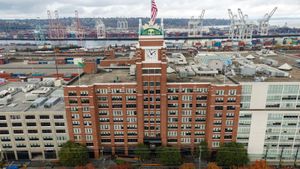The situation in Haiti has reached alarming levels of insecurity and humanitarian disaster as gang violence continues to spiral out of control, casting shadows over the capital, Port-au-Prince. Recently, the Haitian Bishops’ Conference issued a poignant message calling for urgent assistance, emphasizing the overwhelming threat felt by all citizens due to the unchecked power of armed gangs.
Archbishop Max Leroy Mésidor, the conference president, expressed deep concern in a letter dated November 15, 2024, addressed to government officials and the broader community. He noted, "For two years, we have been operating a pastoral strategy of survival, but since November 11, the violence has taken a serious turn." The letter, marked as a desperate appeal for peace, highlights the catastrophic security breakdown across the nation.
Port-au-Prince is effectively severed from the outside world, exemplified by the recent closure of its main airport following gang assaults on aircraft. Tragically, within just days of these attacks, over 20,000 residents fled their homes as supply chains broke down and fundamental services collapsed, plunging many areas even closer to chaos.
The Bishops’ Conference's declaration inferred the dire need for government action, urging officials to restore order and fulfill their roles as protectors of the populace. The message plead for recognition from all parties involved—armed and unarmed—to collectively resolve the persistent violence. "Something must be done," they insist, underlining the urgency of the moment.
Yet, conditions have deteriorated even more since the bishops expressed their alarm. Reports from The New York Times recently indicated additional gang incursions throughout the capital, which only heightened fears among humanitarian organizations attempting to intervene. Many embassies and aid organizations, including Doctors Without Borders, have begun suspending their operations, citing safety concerns as the UN relocated personnel away from Port-au-Prince.
The United Nations, which operates numerous agencies, had around 300 personnel on the ground, including those from the World Food Program and UNICEF. Sadly, gang leaders exert increasing influence over the interim transitional governing council, effectively sidelining international assistance such as the Kenya-led Multinational Security Support (MSS) mission. Despite its deployment earlier this year, MSS has struggled against heavily-armed groups, and UNICEF recently reported a staggering 70% increase in child recruitment by these gangs.
UNICEF Executive Director Catherine Russell remarked, "Children in Haiti are trapped in a vicious circle—recruited by the very armed groups fueling their desperation, and the numbers are growing." This affirmation exemplifies the severe societal collapse occurring as poverty and violence intertwine, ensnaring even the youngest members of society.
With the humanitarian crisis worsening, international responses have been slow. Many Haitians feel abandoned, voicing their frustrations at the lack of effective support. Dr. Wesner Junior Jacotin shared sentiments echoing the community's fears, stating, "Every Haitian thinks we are being abandoned by the whole world. If I was in another country, believing my life could be at risk at any moment, I would leave too."
Gangs are not just asserting territorial control; they are instilling fear and conducting violent acts against civilians, drastically affecting humanitarian aid efforts. The UN now estimates suffering on an unprecedented scale: fatalities due to gang violence surpassed 4,500, with nearly 150 confirmed dead, many more injured, and thousands displaced within the last week alone.
The human toll extends beyond mere statistics. Reports mention over 54,000 instances of gender-based violence occurring from January to October of 2024, highlighting the pervasive threat women and girls face. The horrific statistics are compounded by extreme limitations on medical care and legal support for victims of violence, resulting from both systemic neglect and societal stigma.
The crisis surrounding gender-based violence has escalated to alarming proportions, including reports from Human Rights Watch indicating a 1000% rise in sexual violence targeting children over the past year. Survivors, often left physically and mentally scarred, face hurdles accessing urgent medical care due to the fear of stigma and potential retribution. "The rule of law is so broken, members of criminal groups commit these atrocious acts without fear of consequences," remarked Nathalye Cotrino, adding emphasis on the need for immediate international support mechanisms to help survivors.
Nationally, the call for aid echoes within the halls of power, with the Haitian government seeking comprehensive peacekeeping support. Miroslav Jenca, UN Assistant Secretary-General, urged the Security Council on November 20 to assess potential peacekeeping options, declaring, "This is not just another wave of insecurity; it is a dramatic escalation showing no sign of abatement."
Meanwhile, the MSS mission attempts to reclaim areas from gang control through targeted operations; still, the government admits to needing more resources and personnel. A statement from MSS earlier this week affirmed their determination to dismantle gang networks, yet skepticism remains among the people. The international community must ramp up efforts—both to reevaluate peacekeeping strategies and to funnel desperately needed resources to aid organizations risking their personnel to deliver support on the ground.
David Lloyd, an American missionary whose life was tragically impacted by gang violence, raised poignant questions about the future of his homeland, stating to reporters, “Seems like everyone who can is relocating out of Port-au-Prince. My question is, after Port-au-Prince is burned, where is next?” His poignant worry about the geographical spread of the crisis encapsulates the uncertainty enveloping the city, where the specter of violence looms large.
For now, as Haiti stands on the brink of catastrophe, local voices and global leaders alike await decisive actions. The dire humanitarian crisis is met with urgent cries for peace—presenting clear evidence of the need for collective global responsibility as the country fights for its survival.



